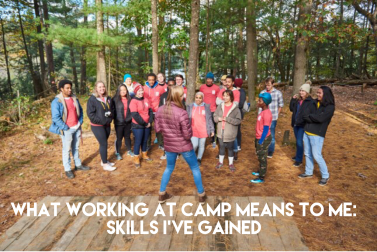Our staff are beginning to dream about the summer months after what seems like record snowfall for the month of February. With our attention shifting to summer planning, we’ve started sharing with each other about what working at camp means to each of us. This is the second in our series “What Working at Camp Means to Me” by one of our Teaching Naturalist’s Ariel Christian who focuses on skills she uses daily at Upham. Catch the first blog written by our Facilities and Operations Director here.
 I am fortunate enough to have had the opportunity to study and work in a field that I truly enjoy. It is almost guaranteed that not everything is going to happen as planned when teaching young people outdoors. Rain may pour while a nature hike is in session, a child may be petrified to get near a snake, or equipment may malfunction during a science lesson. These experiences have taught me to be flexible, because rigidity does not make room for improvement. I appreciate these experiences, because they have pushed me out of my comfort zone and helped me stay in the moment.
I am fortunate enough to have had the opportunity to study and work in a field that I truly enjoy. It is almost guaranteed that not everything is going to happen as planned when teaching young people outdoors. Rain may pour while a nature hike is in session, a child may be petrified to get near a snake, or equipment may malfunction during a science lesson. These experiences have taught me to be flexible, because rigidity does not make room for improvement. I appreciate these experiences, because they have pushed me out of my comfort zone and helped me stay in the moment.
Communication is key in any job, but my experience being an environmental educator has really helped me communicate with students, visitors, and my colleagues. Transparency is a characteristic that helps educators radiate honesty and authenticity while teaching and interacting with others. I have also learned that front-loading information will improve everyone’s experience. I have become a better leader by communicating with groups ahead of time about our schedule, possible issues, and safety rules.
One may not think of listening as an important life skill, but active listening is a key to success in terms of helping people make the best of their experience outdoors. I have found that when I really listen and observe the audience that I am leading, I am better able to serve them as well as create lasting memories for them. Being observant and aware of my audience has also helped me become a more patient person. I am more willing to adapt a lesson or activity to suit the audience.
Problem solving, communication, and active listening are not the only skills that I have improved upon. I cherish the experiences that I’ve had teaching in an outdoor classroom and I am looking forward to growth that new opportunities bring. More than anything, I am thankful for connecting others to the wonders of our natural world. Who knows, I could be inspiring environmental educators of the future.



